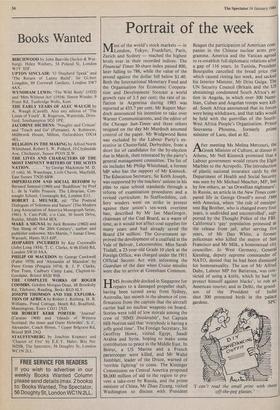Portrait of the week
Most of the world's stock markets — in London, Tokyo, Frankfurt, Paris, Zurich and Sydney — reached the highest levels ever in their recorded indices. The Financial Times 30-share index passed 800, later falling to 786, while the value of the pound against the dollar fell below $1.40. Both the International Monetary Fund and the Organisation for Economic Coopera- tion and Development forecast a world growth rate of 3.5 per cent; the rate of in- flation in Argentina during 1983 was reported at 433.7 per cent. Mr Rupert Mur- doch announced his intention to take over Warner Communications, and the editor of the Chicago Sun-Times and three others resigned on the day Mr Murdoch assumed control of the paper. Mr Wedgwood Benn was excluded by the Labour Party's ex- ecutive in Chesterfield, Derbyshire, from a short list of candidates for the by-election due in March, then reinstated by the party's general management committee. The list of six includes Mr Philip Whitehead, a former MP who has the support of Mr Kinnock. The Education Secretary, Sir Keith Joseph, was supported by the teachers' unions in his plan to raise school standards through a reform of examination procedures and a revised curriculum. In Staffordshire, col- liery winders went on strike in protest against their union's ten-week overtime ban, described by Mr Ian MacGregor, chairman of the Coal Board, as a waste of time, as it would not affect coal supplies for many years and had already saved the Board £34 million. The Government ap- proved the development of a coalfield in the Vale of Belvoir, Leicestershire. Miss Sarah Tisdall, a 23-year-old Grade 10 clerk at the Foreign Office, was charged under the 1911 Official Secrets Act with informing the Guardian of the date when Cruise missiles were due to arrive at Greenham Common.
HMS Invincible docked in Singapore for repairs to a damaged propeller shaft, having been turned away from Sydney, Australia, last month in the absence of con- firmation from the captain that the aircraft carrier had no nuclear weapons on board. Stories were told of low morale among the crew of 'HMS Intolerable', but Captain Hill-Norton said that 'everybody is having a jolly good time'. The Foreign Secretary, Sir Geoffrey Howe, visited Egypt, Saudi Arabia and Syria, hoping to make some contribution to peace in the Middle East. In Beirut, a US Marine and a French paratrooper were killed, and Mr Walid Jumblatt, leader of the Druze, warned of 'terrible fighting' to come. The Kissinger Commission on Central America proposed $8,000 million of aid to the region to pre- vent a take-over by Russia, and the prime minister of China, Mr Zhao Ziyang, visited Washington to discuss with President Reagan the participation of American com- panies in the Chinese nuclear arms pro- gramme. America and the Vatican agreed to re-establish full diplomatic relations after a gap of 116 years. In Tunisia, President Bourguiba cancelled the bread price rise which caused rioting last week, and sacked his Interior Minister, Mr Driss Guiga. The UN Security Council (Britain and the US abstaining) condemned South Africa's ac- tion in Angola, in which over 300 Nami- bian, Cuban and Angolan troops were kill- ed. South Africa announced that its forces were being withdrawn, and that talks would be held with the guerrillas of the South- West Africa People's Organisation. Prince Souvanna Phouma, formerly prime minister of Laos, died at 82.
A fter meeting Ms Melina Mercouri, the Greek Minister of Culture, at dinner in Athens, Mr Neil Kinnock promised that a Labour government would return the Elgin Marbles to the Acropolis. The introduction of plastic national insurance cards by the Department of Health and Social Security was seen by Mr Michael Meacher, MP, but by few others, as 'an Orwellian nightmare'. In Russia, an article in the New Times com- pared life in George Orwell's novel 1984 with America, where 'the rule of omnipo- tent Big Brother, who is changed every four years, is undivided and uncontrolled', sup- ported by the Thought Police of the FBI. California's 'gay' population protested at the release from jail, after serving five years, of Mr Dan White, a former policeman who killed the mayor of San Francisco and Mr Milk, a homosexual city councillor. In West Germany, General Kiessling, deputy supreme commander of NATO, denied that he had been dismissed for homosexuality. The son of Mr Alfred Dubs, Labour MP for Battersea, was con- victed of using a knife, which he had 'to protect himself against blacks', to rob an American tourist; and in Delhi, the grand- son of the President of India shot 300 protected birds in the palace
'I can't read the small print with these off-the-peg glasses.'






































 Previous page
Previous page